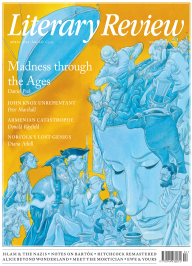Richard Davenport-Hines
Notes from a Sunset of Culture
My Dear BB: The Letters of Bernard Berenson and Kenneth Clark, 1925–1959
By Robert Cumming (ed)
Yale University Press 571pp £25
Bernard Berenson (1865–1959) and Kenneth Clark (1903–83) were art historians and collectors whose ruthless intelligence, pictorial memory, eloquence in exposition and hard-won erudition were matchless in their fields. Berenson was the Lithuanian-born son of a Jewish pedlar, but got himself to Harvard, began transforming the study of Italian Renaissance art in the 1890s and, by his business with dealers and American collectors, made a fortune, which he spent on his luxurious Florentine villa, I Tatti, with its famous art library, and on princely hospitality. Clark, the only child of a boorish Edwardian parvenu, became one of the foremost public men of his time, made himself an outstanding television educator, bought a picturesque castle in Kent and received a peerage. Their letters, sent winging between London and the outskirts of Florence, will absorb anyone interested in the history of connoisseurship. They depict not only the unrelenting pursuit of intellectual and aesthetic excellence, but also that disciplined, unconfiding, self-respecting cordiality between intelligent people that today’s populists find stilted, frosty and superior. Each man, for example, knew that the other was a seasoned womaniser, but they both had the sense to keep their amatory exploits sealed in a separate compartment from their friendship.
In the mid-1920s Clark spent two years as Berenson’s pupil-apprentice, living at I Tatti and helping in a revision of the older man’s great work on Florentine drawings. Clark’s appointment in 1934 (aged thirty-one) as director of the National Gallery and his wife’s presidency of the Society of London Fashion

Sign Up to our newsletter
Receive free articles, highlights from the archive, news, details of prizes, and much more.@Lit_Review
Follow Literary Review on Twitter
Twitter Feed
Under its longest-serving editor, Graydon Carter, Vanity Fair was that rare thing – a New York society magazine that published serious journalism.
@PeterPeteryork looks at what Carter got right.
Peter York - Deluxe Editions
Peter York: Deluxe Editions - When the Going Was Good: An Editor’s Adventures During the Last Golden Age of Magazines by Graydon Carter
literaryreview.co.uk
Henry James returned to America in 1904 with three objectives: to see his brother William, to deliver a series of lectures on Balzac, and to gather material for a pair of books about modern America.
Peter Rose follows James out west.
Peter Rose - The Restless Analyst
Peter Rose: The Restless Analyst - Henry James Comes Home: Rediscovering America in the Gilded Age by Peter Brooks...
literaryreview.co.uk
Vladimir Putin served his apprenticeship in the KGB toward the end of the Cold War, a period during which Western societies were infiltrated by so-called 'illegals'.
Piers Brendon examines how the culture of Soviet spycraft shaped his thinking.
Piers Brendon - Tinker, Tailor, Sleeper, Troll
Piers Brendon: Tinker, Tailor, Sleeper, Troll - The Illegals: Russia’s Most Audacious Spies and the Plot to Infiltrate the West by Shaun Walker
literaryreview.co.uk